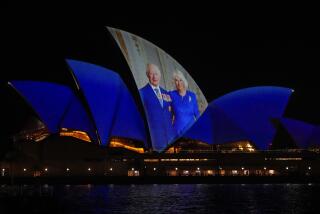Once Considered Shameful, It’s Now Fashionable : Australians Proud of Convict Ancestors
SYDNEY, Australia — As their nation’s bicentennial approaches, Australians are searching their roots and many have found jailbirds among them.
Genealogy has become a fad as the country gears up for the 1988 celebrations to mark the arrival of the first European settlers, which included what is known as the First Fleet--11 ships carrying 736 convicts from England.
A few years ago many Australians were ashamed to admit blood links to the First Fleet. Now, it’s fashionable.
“People have only now begun to feel it is acceptable to admit they had convict ancestors while before they did their darndest to get rid of the evidence,” said a noted genealogist, Jan Worthington.
It is estimated that only 20% of the country’s 16 million people can trace direct blood lines to the 167,000 criminals transported from 1788 to 1868 for crimes ranging from highway robbery to sheep rustling.
Australia has become a multiracial society.
Although slow to arrive, free settlers came in droves in the 1830s, driven across the world by social upheavals in a Britain becoming industrialized, or in the case of the Irish by the desperate need to escape the ravages of the potato famine.
They were followed by German Lutherans seeking religious freedom. The gold rush years of the 1850s signaled another massive influx of people and post-World War II immigration policies brought 3.35 million more. Once again many came from Britain.
More recently, Australia has accepted tens of thousands of refugees--Vietnamese, Ethiopians and Soviet Jews. It is estimated that 20% of the population was born overseas.
“As a nation we have an identity crisis,” said Nick Vine Hall, director of the Society of Australian Genealogists.
“Our increasing awareness and appreciation of family history stems from a need to feel more Australian, to relate more directly and personally to our past, to experience a sense of belonging,” said Hall, who traced his family tree to the British explorer credited with discovering Australia, Capt. James Cook.
Since he became the society’s director in 1978, membership has grown from 1,500 to 11,000. By 1988 the figure is expected to double.
Its staff of 300 volunteers receive hundreds of letters a day from people wanting authentic, well-documented pedigrees. The society says it can help almost any ethnic group, even aborigines whose 70,000-year history is mostly unrecorded and steeped in legend.
“We get Germans, Italians, Chinese--even Koreans,” genealogist Worthington said in an interview. “Everybody is getting in on the act. After all, they’re now part of Australia.
“People’s interest in the past developed very late because we were told at school we didn’t have any history.”
Another factor in the scramble to find convict blood was the showing of “Roots,” the American television series based on Alex Haley’s search for his African ancestors.
“It got a lot of people thinking about themselves and their origins,” Worthington said.
She added that many Australians are surprised to discover a shared heritage with Americans. England also sent convicts to the American colonies until the Revolution.
By the mid-1700s England’s jails were bulging and King George III ordered convicts sent to Australia, then an almost unknown land mass deemed to have possible strategic qualities. Those selected were serving terms of seven years to and life. Some were guilty of nothing more than stealing food, then a capital offense.
“Australians like knowing they’ve got convict blood in their veins but Americans are just crazy about royal blood lines. It doesn’t matter to them if it’s legitimate or illegitimate,” Worthington said.
“It’s almost as if they’re compensating for their lack of a royal family.” Britain’s royal family is also recognized as the royal family of Australia.
More to Read
Sign up for Essential California
The most important California stories and recommendations in your inbox every morning.
You may occasionally receive promotional content from the Los Angeles Times.









